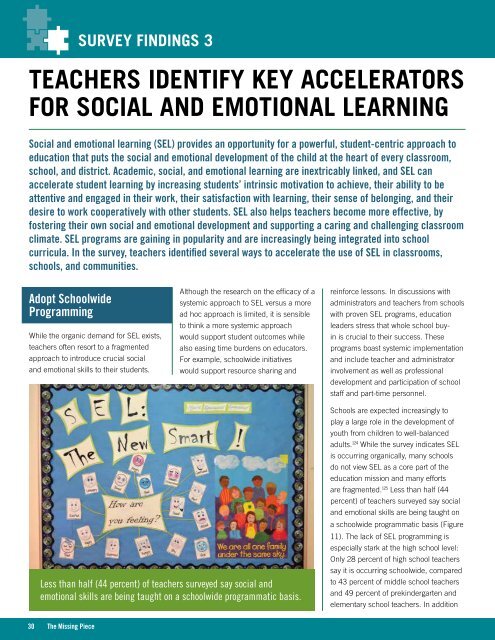CASEL-Report-low-res-FINAL
CASEL-Report-low-res-FINAL
CASEL-Report-low-res-FINAL
You also want an ePaper? Increase the reach of your titles
YUMPU automatically turns print PDFs into web optimized ePapers that Google loves.
30 the Missing Piece<br />
Survey FindingS 3<br />
TEACHERS idENTify kEy ACCELERAToRS<br />
foR SoCiAL ANd EMoTioNAL LEARNiNg<br />
Social and emotional learning (SEL) provides an opportunity for a powerful, student-centric approach to<br />
education that puts the social and emotional development of the child at the heart of every classroom,<br />
school, and district. Academic, social, and emotional learning are inextricably linked, and SEL can<br />
accelerate student learning by increasing students’ intrinsic motivation to achieve, their ability to be<br />
attentive and engaged in their work, their satisfaction with learning, their sense of belonging, and their<br />
desire to work cooperatively with other students. SEL also helps teachers become more effective, by<br />
fostering their own social and emotional development and supporting a caring and challenging classroom<br />
climate. SEL programs are gaining in popularity and are increasingly being integrated into school<br />
curricula. In the survey, teachers identified several ways to accelerate the use of SEL in classrooms,<br />
schools, and communities.<br />
Adopt Schoolwide<br />
Programming<br />
While the organic demand for SEL exists,<br />
teachers often <strong>res</strong>ort to a fragmented<br />
approach to introduce crucial social<br />
and emotional skills to their students.<br />
Although the <strong>res</strong>earch on the efficacy of a<br />
systemic approach to SEL versus a more<br />
ad hoc approach is limited, it is sensible<br />
to think a more systemic approach<br />
would support student outcomes while<br />
also easing time burdens on educators.<br />
For example, schoolwide initiatives<br />
would support <strong>res</strong>ource sharing and<br />
Less than half (44 percent) of teachers surveyed say social and<br />
emotional skills are being taught on a schoolwide programmatic basis.<br />
reinforce lessons. In discussions with<br />
administrators and teachers from schools<br />
with proven SEL programs, education<br />
leaders st<strong>res</strong>s that whole school buyin<br />
is crucial to their success. These<br />
programs boast systemic implementation<br />
and include teacher and administrator<br />
involvement as well as professional<br />
development and participation of school<br />
staff and part-time personnel.<br />
Schools are expected increasingly to<br />
play a large role in the development of<br />
youth from children to well-balanced<br />
adults. 124 While the survey indicates SEL<br />
is occurring organically, many schools<br />
do not view SEL as a core part of the<br />
education mission and many efforts<br />
are fragmented. 125 Less than half (44<br />
percent) of teachers surveyed say social<br />
and emotional skills are being taught on<br />
a schoolwide programmatic basis (Figure<br />
11). The lack of SEL programming is<br />
especially stark at the high school level:<br />
Only 28 percent of high school teachers<br />
say it is occurring schoolwide, compared<br />
to 43 percent of middle school teachers<br />
and 49 percent of prekindergarten and<br />
elementary school teachers. In addition


